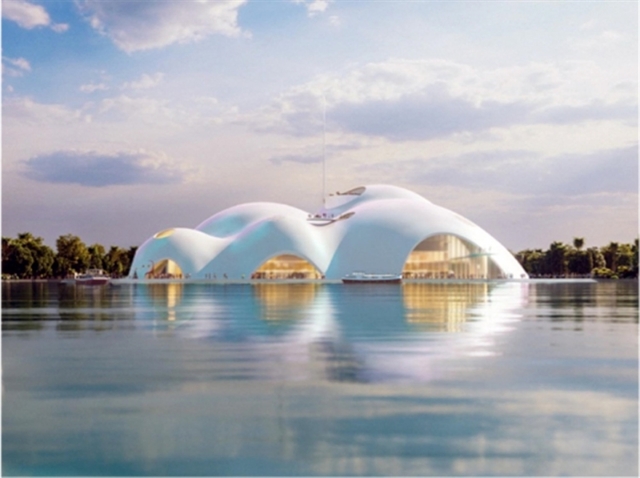 Life & Style
Life & Style
.jpg)
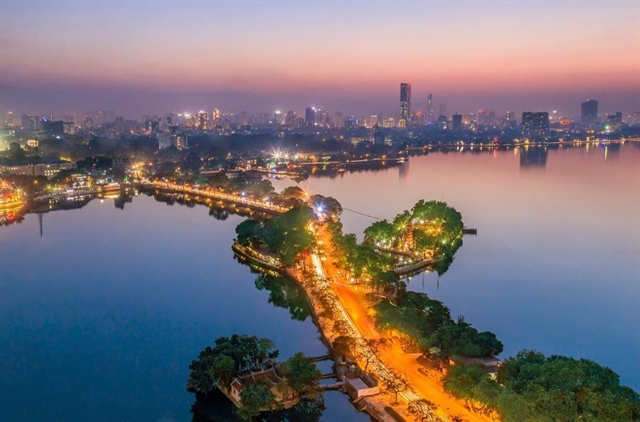 |
| A view of the West Lake of Tây Hồ District, a potential area for tourism development. — Photo tayho.hanoi.gov.vn |
Thanh Hà
HÀ NỘI — Tây Hồ is a district in the northwest of Hà Nội with many historic landmarks, heritage sites and beautiful natural landscapes, a great advantage for tourism development.
However, its potential has not been fully exploited and there are still challenges that prevent the district from becoming a must-visit destination on tourists' lists.
Tây Hồ has a natural area of more than 2,400ha and is home to 71 historical and cultural relics. These include 18 pagodas, 20 communal houses, 33 temples and shrines. Among them, 42 relics have been ranked; two intangible cultural heritages and 15 traditional festivals. Each relic is a unique architecture, associated with the development history of the ancient capital of Thăng Long.
Notably, the 500ha West Lake has long been a famous scenic spot because of its spacious space, poetic scenery, rich cultural heritage system and traditional craft villages. It is considered the "pearl" and "treasure" of the capital in particular and the country in general, attracting millions of local and international visitors every year.
Some famous relics in the West Lake area include: Trấn Quốc, Kim Liên, Tảo Sách and Vạn Niên pagodas, and Tây Hồ and Đồng Cổ temples.
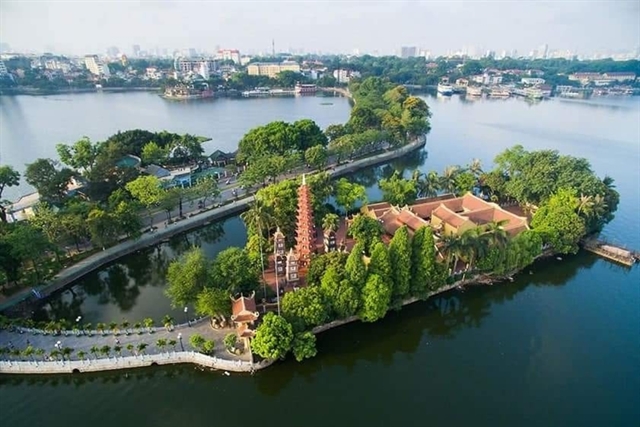 |
| An overview of Trấn Quốc Pagoda, the oldest pagoda in Hà Nội and one of the best known destinations of Tây Hồ District. — Photo dangcongsan.vn |
Besides, the West Lake is surrounded by many traditional craft villages such as peach growing in Nhật Tân; Tứ Liên and Quảng Bá's kumquat; and dó (poonah) paper making in Bưởi. Each village has its own traditional and unique festival to celebrate their craft every year.
Among them, the Loyalty Oath Festival of Đồng Cổ Temple, Phú Thượng sticky rice making and Quảng An lotus-scented tea making are national intangible cultural heritages.
Tây Hồ Temple is one of the most sacred places in Hà Nội dedicated to Liễu Hạnh Goddess, one of the Mother Goddesses the worshipping of whom has been recognised a world intangible cultural heritage by UNESCO since 2016.
 |
| Tây Hồ Temple offers visitors an interesting trip that combines sightseeing, worshipping, and learning about rich Vietnamese traditions. |
The area has many international standard hotels and resorts serving all demands of customers such as events, MICE, leisure, service and other tourism activities.
Assessing the potential and advantages of tourism in Tây Hồ, Deputy Director of the Hà Nội Department of Tourism Trần Trung Hiếu said many traditional crafts had been formed in the West Lake area in its long history. Its rich historical relics and the socio technical infrastructure systems invested in by the city made Tây Hồ the most prominent scenic spot of the capital.
Along with a huge number of accommodation establishments, one three-star and four five-star hotel projects were under construction.
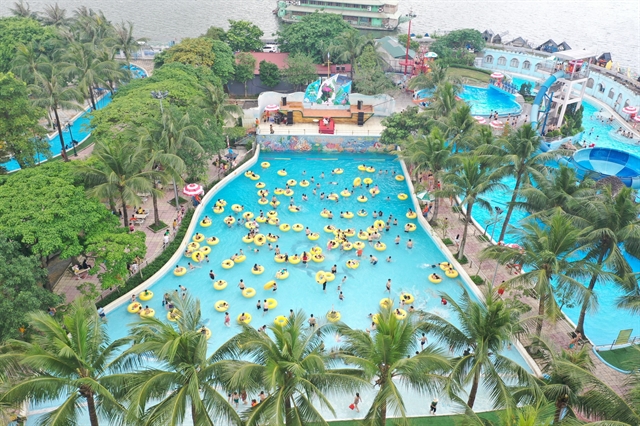 |
| Hồ Tây Water Park is a favourite destination for people in the summer. Photo Hồ Tây Water Park Facebook |
In the coming time, the area plans to allow the operation of 12 types of services such as boating, canoeing, hot air ballooning, paragliding, and water golf.
"These are favourable opportunities for Tây Hồ to develop a variety of services and entertainment to complement traditional service products," Hiếu said.
District's efforts
The local authority has recognised the tourism potential of Tây Hồ and built plans to develop culture and tourism in the area to turn it into one of the major tourist centres of the city and country, according to Vice Chairwoman of the Tây Hồ District People's Committee Bùi Thị Lan Phương.
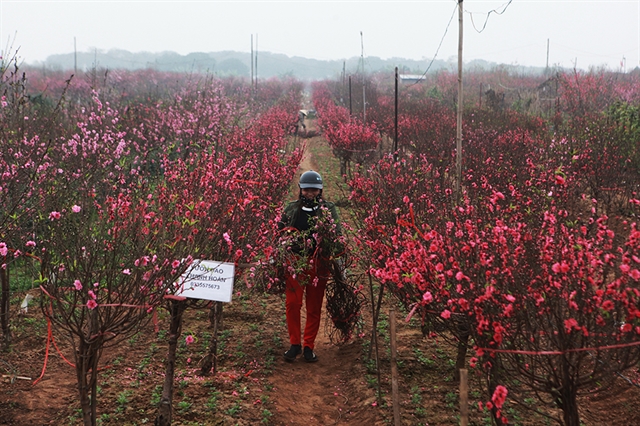 |
| Nhật Tân Ward's peach field is one of the destinations included in Tây Hồ District's plan for tourism development. Photo kinhtemoitruong.vn |
The district has issued and implemented a number of projects such as a culinary and street art performance space at Trịnh Công Sơn pedestrian street; a large square and outdoor stage specialising in organising cultural and artistic performances, exhibitions, and introduction of craft village products every weekend; Sen Tây Hồ culinary culture area and flower valley; Nhật Tân traditional peach blossom craft village combined with tourism; Tứ Liên ornamental kumquat planting craft village combined with tourism; and an introduction of the traditional dó paper making.
Currently, the district is working on a project to expand the lotus growing area to 25ha so that visitors to Tây Hồ can enjoy the beauty of lotus flowers, enjoy and shop for lotus products all year round.
In July, the first Lotus Festival was organised with many activities such as a workshop on "Conservation and development of Vietnamese lotus"; an inauguration of an OCOP product introduction and sales centre; an exhibition of lotus installation art space and lotus photos in daily life; a Green Journey cycling demonstration with the participation of 7,000 people; a photo contest featuring beautiful women, traditional áo dài and lotus; and a highlight of a semi-realistic art programme "Story of Lotus". The five-day event attracted more than 50,000 visitors.
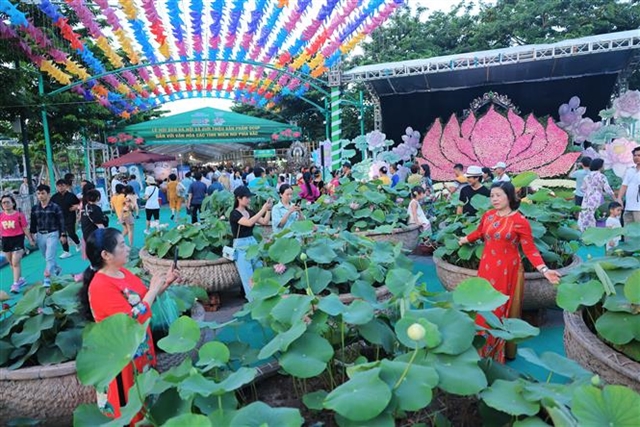 |
| Many tourists take part in the Lotus Festival 2024 in Tây Hồ District in July. VNA/VNS Photo |
Earlier, many other activities such as Peach Blossom and Kumquat Festival, Get on Hà Nội 2024 and Tây Hồ Half Marathon và Kid Rub the Earth were organised, luring the participation of hundreds of thousands of local people and foreigners.
Chairwoman of the People's Council of Tây Hồ District Lê Thị Thu Hằng also proposed the idea of organising a West Lake Festival to tell the cultural story of the land.
She said the festival should be associated with the solutions of how to develop the West Lake to match its potential, how to make tourists feel the fresh and beautiful environment and friendliness of local people when they are in Tây Hồ.
Expert opinions
"The socio-economic development of Tây Hồ District is facing a new and favourable opportunity, in which the service sector is the foundation and green tourism which connects cultural tradition with modernity is the main economic driving force of this land," said Associate Professor, Dr Bùi Tất Thắng, former director of the Institute of Development Strategy under the Ministry of Planning and Investment.
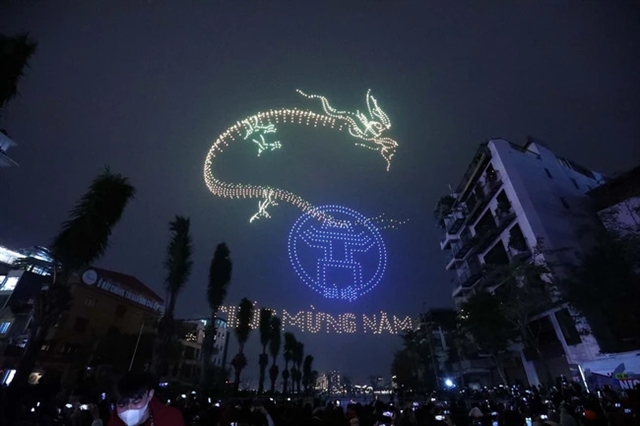 |
| A drone light show during the Get on Hà Nội Festival 2024, an event that attracts many people to Tây Hồ District. |
"At the moment, issues such as spatial arrangement, infrastructure development and human resource preparation following international standards will be the basis to ensure the implementation of sustainable tourism development goals."
Dr Lê Thị Thu Hương from the Hà Nội Metropolitan University said the historical and cultural space of West Lake contained many tangible and intangible cultural heritages, as a living history that demonstrates a long period of building and defending the country of the Vietnamese people.
However, the West Lake and the surrounding area were not exploited to its full potential. There were many activities and efforts made to attract tourists but a breakthrough was still needed.
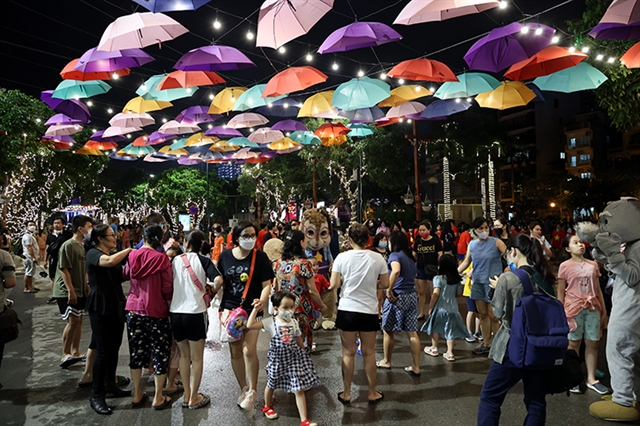 |
| Trịnh Công Sơn pedestrian street is an attraction for tourists and residents from neighbouring areas. VNA/VNS Photo |
"To develop and build West Lake into a focal point it is necessary to understand the history and culture of this area. The first steps should be restoring and preserving historical and cultural relics along the West Lake and surrounding area; preserving and developing traditional festivals and traditional craft villages; and building cultural spaces," Hương said.
"These activities require resources and participation from all sectors and especially local people who are direct owners of these tangible and intangible cultural heritages and historical and cultural space of the West Lake."
Associate Professor, Dr Nguyễn Ngọc Sơn from the National Economics University suggested that the district had potential to develop the night-time economy by promoting their projects such as expanding business hours to 2am; night walking street and dining area; and night performing arts which made positive contributions to the GRDP of the district and Hà Nội.
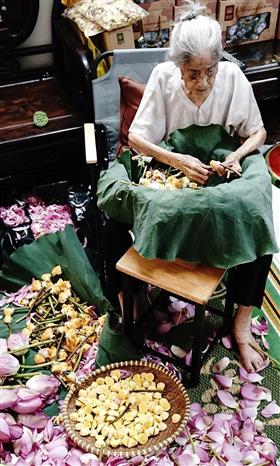 |
| An old woman makes lotus-scented tea from Tây Hồ lotus flowers. VNA/VNS Photo |
Associate Professor, Dr Lê Thu Hoa of the National Economics University believes that the sustainable environment plays an important role in tourism development.
"Tây Hồ has been implementing craft village development projects. Accordingly, priority should be given to developing green tourism and eco-tourism, following guidelines on environmental, ecological and biodiversity protection. So it is necessary to study the economic type, scale, and density of activities of various types in craft villages," said Hoa, adding that stricter regulations on wastewater, exhaust gas, garbage were really needed.
From the point of view of tourism agencies, representatives fed back that many destinations in the district did not pay much attention to service quality and relationships with tourism businesses. They called for a tight "handshake" between the two sides.
Director of VietFoot Travel Phạm Duy Nghĩa said: "Destinations don't care about quality of service and products. Their relic sites are very unique but the lack of connections with travel agencies prevents us from bringing tourists there."
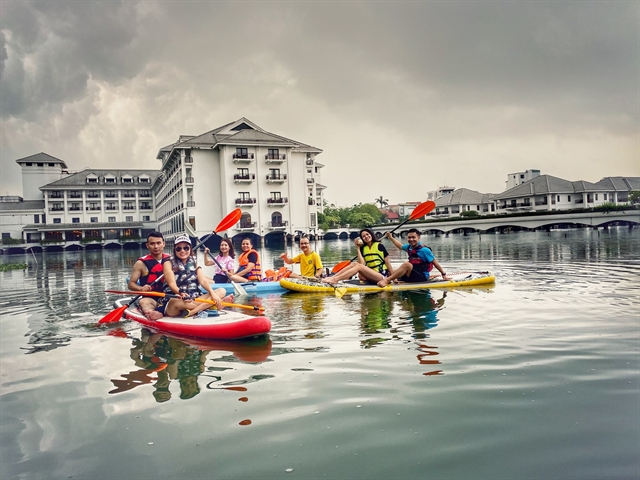 |
| SUP is one of the new sport activities for people in the West Lake. Photo Kayak&SUP Group |
Sharing the same opinion, Director of the Asian Tourism Development Institute Phạm Hải Quỳnh said that if Tây Hồ wanted to develop tourism, it needed to start with quality products and services along with and close connection with travel businesses.
“The district government must connect craft households, business households, and management boards of relics with travel agencies and build tours that include all activities. When businesses and people benefit, unique traditional values will be protected and leveraged for tourism to develop," Quỳnh said. — VNS
.jpg)



